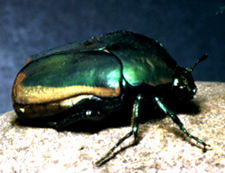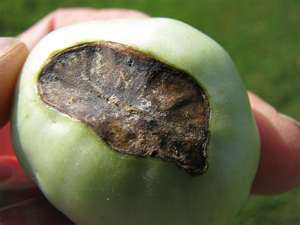|
 Dry weather tips and musings Dry weather tips and musings
By John
Fulton, University of Illinois Extension
 Send a link to a friend
Send a link to a friend
[July 26, 2012]
We are going to have trouble getting
that new grass seed established with little moisture available and
the high temperatures. Normal fall seeding times would begin in
about two weeks, but I would recommend saving time and dollars if
rain doesn't come. If you're in an area that hasn't received
moisture for about a month or more, you might want to consider
watering with a quarter of an inch or so to keep existing grass
roots and crowns alive. This should be done on a weekly basis. This
won't green up the grass, but will allow it to green up when it does
start raining. The idea is to keep the roots and crowns of the
plants from completely drying out. Once this happens, recovery isn't
even an option. Then we are looking at reseeding into horrible
conditions -- unless Mother Nature begins smiling on us.
|
 Perennials are also suffering during this extended dry period.
It is a good idea to water perennials (flowers, shrubs, trees,
etc.) with an inch of water a week. You can use a sprinkler and
catch water in a can to tell how much an inch is. As for using
the deep root feeders-waterers, most roots that take up water
and nutrients are in the upper foot of soil, so broadcast
applications with a sprinkler are probably most effective and
easier to apply. A couple of inches of mulch will also help
retain moisture and keep the roots cooler. Perennials are also suffering during this extended dry period.
It is a good idea to water perennials (flowers, shrubs, trees,
etc.) with an inch of water a week. You can use a sprinkler and
catch water in a can to tell how much an inch is. As for using
the deep root feeders-waterers, most roots that take up water
and nutrients are in the upper foot of soil, so broadcast
applications with a sprinkler are probably most effective and
easier to apply. A couple of inches of mulch will also help
retain moisture and keep the roots cooler.The only things
actively growing in many lawns at this time are called weeds.
One of the traditional weeds during dry periods is plantain, and
there are two common types in our area. Buckhorn plantain has
narrow leaves and a spiked seed head. Broadleaf plantain has the
same type of seed head, but as the name suggests, it has broad
leaves. As the only green areas in some lawns, control with
2,4-D may be beneficial. That's assuming you don't want the
weeds and the unsightly green spots.

Dry weather doesn't bode well for early tomatoes either.
There is a perennial problem termed blossom-end rot, which
causes a leathery rot on the bottom of the fruits. This is
caused by a calcium imbalance in the plant. The calcium
imbalance, in turn, is usually caused by uneven moisture supply
to the plant. A thorough watering and a deep layer of mulch will
usually help to prevent this problem. This year, I wouldn't bet
on it solving things -- but it will improve your odds of getting
whole tomatoes.
On the plus side, the warm nighttime
temperatures have halted the progression of anthracnose and
other leaf spot fungi on our shade trees. As mentioned, the
watering of perennials will go a long way in assisting them
through the dry times, as well as help them recover from disease
and insect problems.
[to top of second column] |

Insect development
Insects continue to develop well ahead of schedule. We are
running at least three weeks ahead in most cases. This means bagworm
control is something for next year's schedule. Japanese beetles will
begin winding down about now. Remember, these are emerging eggs laid
last summer and fall. Unless something drastic happens, beetle
number should be greatly reduced next year. This is due to poor egg
and larvae survival in powder-dry soils. It's to the point no
self-respecting beetle would even want to lay eggs in most of the
turf areas that haven't received rain or water.

One insect of note the past week or so is the green June bug.
These are large, iridescent green beetles that also come from a grub
stage. Most often, these beetles lay their eggs in areas high in
organic matter, such as compost piles or mulched flower beds. They
really aren't much of a pest but do sound like bumblebees flying.
[By
JOHN FULTON,
University of Illinois Extension] |